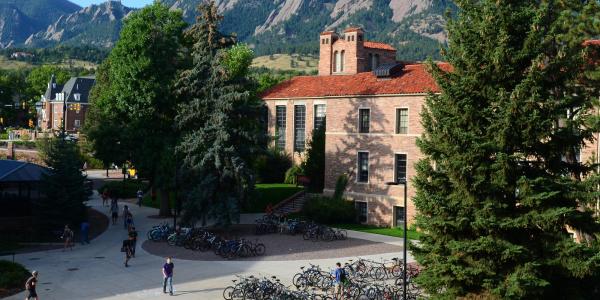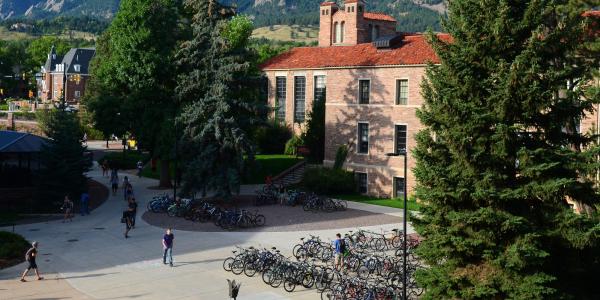In a special virtual meeting on Wednesday, Aug. 12, the University of Colorado Board of Regents heard an update from CU Boulder Chancellor Philip DiStefano about the Boulder campus’s plans for a COVID-19-ready fall semester, which included student move-in and testing, as well as ongoing controls and response plans.
Move-in and registration
DiStefano reported 33,027 students have enrolled for classes; 29,310 of those students have enrolled for at least one fully in-person course or a hybrid course with an in-person component; and 3,717 students have enrolled in courses that are fully remote or fully online.
More than 7,500 students are moving into residence halls between Aug. 17 - 21.
“I’m very proud of what we’ve been able to accomplish over the last several months,” DiStefano said. “What our students are going to be experiencing this semester will be unlike any other semester at CU Boulder.”
DiStefano reported that all first-year students living on campus will either provide proof of a recent negative COVID-19 test or will undergo testing before moving in. He explained that the RT-LAMP test that CU Boulder faculty members at the BioFrontiers Institute have developed has enabled campus to return test results rapidly as part of the move-in process.
DiStefano reported that when resident advisors returned to campus last week, all of them tested negative for COVID-19.
Ongoing controls and data
DiStefano told the board that the Boulder campus is monitoring many different factors, such as infection rates, hospital capacity and campus density, as the campus makes decisions about how to proceed during the course of the semester. DiStefano announced a new dashboard that will be regularly updated to provide transparency about campus data.
Professor Matt McQueen, a faculty member in the Department of Integrative Physiology and the director of the Epidemiology Laboratory, updated the board in further detail about campus plans for testing, response and environmental controls.
Monitoring and testing
McQueen told the board that while CU Boulder is not planning to conduct move-in testing for off-campus students, the campus does plan to conduct surveillance testing of off-campus students throughout the semester.
McQueen explained that the campus will need to make day-to-day decisions about how to test based on campus and community needs. He said that testing resources will be used to respond to potential events on campus, such as an outbreak in a particular community, and that he hopes campus will be able to regularly test students beyond such events in order to understand how the virus is moving through the community.
McQueen emphasized to the board the need to be able to gather data that will allow the university to assess the health of the campus and the community. He told the board that because CU Boulder will be conducting surveillance testing, rather than testing symptomatic people only, there should be no surprise when positive cases start to appear.
”While we will rely upon some data that is collected by other public health authorities, the campus has also built capabilities for COVID-19 testing that exceed the capabilities that exist in the community,” McQueen said.
McQueen says that because the campus will be discovering asymptomatic and presymptomatic carriers, the numbers may look high.
“That's a good thing because it will allow us to work to prevent the spread of disease from individuals who are infected,” McQueen said.
Contact tracing
McQueen reported that in addition to testing, CU Boulder has stood up a robust contact tracing program that involves medical staff as well as more than 50 students who are earning academic credit to support campus contract tracing efforts.
Environmental measures
McQueen briefly highlighted work to reduce the ability of COVID-19 to spread in campus facilities, such as by evaluating each campus building to make sure the flow of air exceeds the recommended requirements. McQueen also cited other environmental controls, including following standard public health measures such as cleaning protocols. More information on these and related topics can be found on the Infrastructure Mitigation Efforts website.
Behavioral factors
McQueen also told the board that emphasizing behaviors such as social distancing and the wearing of face coverings are some of the most important strategies for mitigating the spread of COVID-19 on campus.
“While testing and contact tracing are good, limiting the spread of infection is better. Social distancing and masking are the best tools in our arsenal to prevent the spread of the disease,” McQueen said.
Tuition resolution
Regent Heidi Ganahl proposed a resolution that would provide a tuition discount. President Kennedy and several regents expressed concern over further budget cuts that they predicted would negatively impact the quality of education. The board voted against the resolution in a 5-4 vote.



